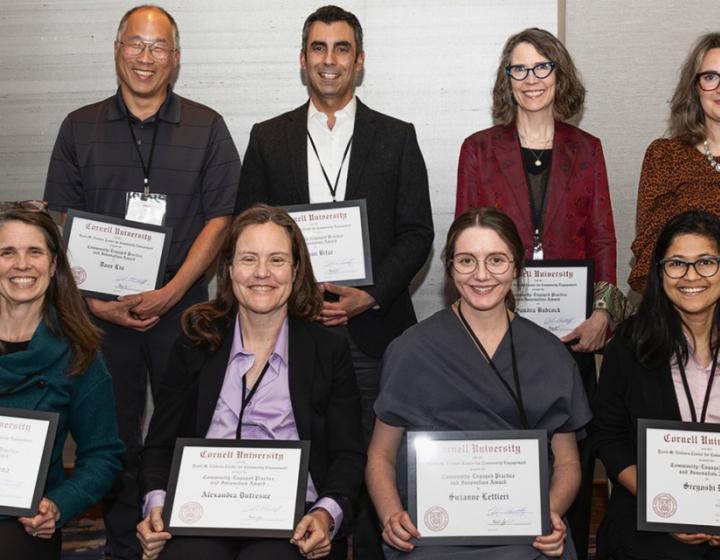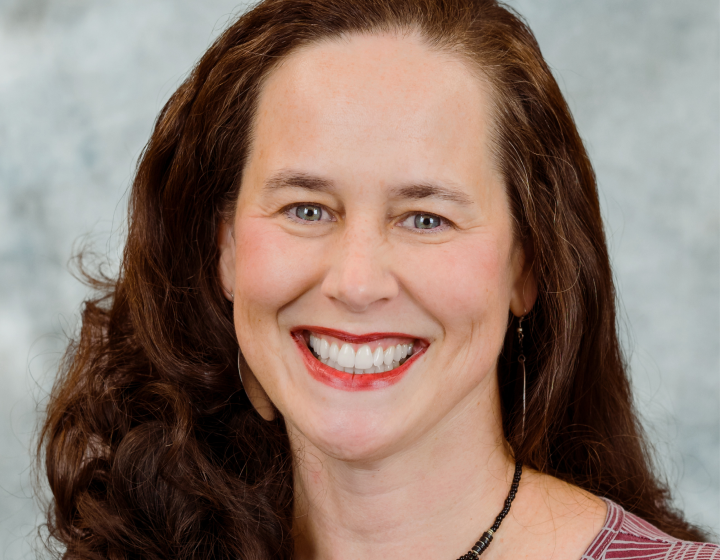Lightening the load: Scholarship programs help with veterinary student debt

Perry Koehler ’16, a second-year veterinary student, was able to attend Cornell as an undergraduate thanks to substantial financial aid. But when it came time to consider vet schools, he had to choose among several colleges that were competitively priced. And as an out-of-state resident—originally hailing from Texas and, later, Tennessee— the initial cost of attending the Cornell University College of Veterinary Medicine was higher than other schools. That is, until he factored in scholarships.
“When I did all the math I found the other schools may have been slightly less expensive but they didn’t really offer scholarship money like Cornell does,” Koehler says. “Cornell was up front in trying to support me. Even though its ticket price seems more, when you take into account all the scholarship money I receive, Cornell was affordable. And I wanted to be here.”
As a student, Koehler tries to be as fiscally savvy as possible. He borrows only enough money through loans to cover the remainder of his tuition, and he diligently works several part- time jobs to pay all other expenses. He lives modestly and avoids extravagant spending. And still he is on track to graduate with roughly $150,000 in debt.
The need among veterinary students for financial support could not be greater, according to Kristin Pennock, director of student financial planning. Her office estimates that tuition and living expenses will total about $52,750 for in-state residents and $68,980 for out-of-state residents for the 2017–18 academic year, while the median debt load of a CVM graduate hovers around $152,000.
“People don’t go to vet school to rich. They do it because they’re passionate about animals,” Pennock says. “If there’s anything I can do to help them ease that burden, that’s what I try to do.”
Daunting debt, inspiring support
As director of student financial planning, Pennock sees firsthand how students struggle with the cost of pursuing their passion. From the beginning, she watches them wrestle with whether or not they can afford to matriculate at Cornell, all the way through to the moment they graduate, when they must face the reality of repaying their debt. During the intervening four years, Pennock works to match students with scholarships big and small so that every student in need receives at least some form of financial support.

The College currently offers a total of 240 scholarships that range in size, with larger sums divvied up among multiple students. Every student’s award is calculated based on their income and assets (plus that of their parents, if the student is under age 30), as well as any previous debt the student may be saddled with from their undergraduate years. The average total award per student is generally around $7,500, Pennock says, and the sum is often patched together from several different scholarships. Many scholarships have very specific criteria that determine which students are eligible to receive them; sometimes a student must live in a particular region or have a specific research interest, such as feline medicine. Pennock’s team ensures that all scholarships are ultimately awarded, even if it means going back to a donor and asking if their criteria might be more flexible to accommodate a student in need.
“We definitely don’t sit on the money,” Pennock says. “We make sure it’s awarded as soon as it’s available.”
Currently 82 percent of CVM students receive scholarships, according to Pennock, who readily admits that $7,500 a year is only a partial solution to handling what eventually becomes an unwieldy debt load. The students greatly appreciate any support they can get.
“It’s such a great feeling to be part of that process to award the scholarships. Students are so excited to receive any additional funding that will ease their debt burden. It’s life-altering,” Pennock says. “Recently I was able to award a scholarship to a student who was in a really bad spot. She’s already borrowed so much and she emailed us and said, ‘I have to take out an additional $2,000 because I can’t get by without it.’ I looked and we actually had a scholarship that had just come through. The response I received after notifying her of the additional gift aid was ‘I can’t believe this, thank you so much.’ I’ve had people come in and hug me, crying. That’s definitely the best part of my job because their student loan debt can be so daunting. It’s very rewarding to be a part of reducing their burden.”
Maximizing impact
In an effort to help students cover more of their debt, Pennock’s office helps them seek out external scholarships from professional veterinary organizations, kennel clubs, and other sources. And the College is trying to maximize the impact of its own scholarships by participating in a university-wide fundraising challenge that was launched earlier this year. The initiative aims to create up to 100 new endowed scholarships that total $25 million in funding for undergraduates, professional school students, and graduate students across the Ithaca campus and at Cornell Tech. Every gift of $200,000 or more receives matching funds on a 1-to-4 basis; for example, a $200,000 gift would garner a $50,000 boost. CVM has already raised more than $1.7 million through the challenge, according to Alison Rose Smith, major gifts officer with Alumni Affairs and Development (see list below).
“A challenge gift is a way to inspire someone who may already be considering a gift,” Smith says. “If they stretch just a little bit more, they can maximize their support with funds other than their own. And within the context of a University challenge, it’s a great way to highlight our College while participating in a broader program.”
Smith’s career in fundraising at Cornell began in 1991. In that time she has seen an evolution in student financial needs as well as the ways those needs can be addressed by the College and an enthusiastic donor base. “The 1990s were really about raising awareness and educating people that a veterinary student’s debt load would be impacted more with scholarships than with loans,” she says. “That was a big shift.”
“Prior to the 1970s, students rarely had to take out loans for tuition, and were also able to work part-time jobs to help pay for their living expense,” Smith says. “Scholarships weren’t a priority then because as a contract college, the State of New York actually supplemented a DVM education. Those days are gone.”
Over the past several years, the total amount of available scholarships has annually averaged about $2.2 million. As the cost of veterinary school has increased, so has the drive to raise larger and larger sums of money for establishing permanent endowments. While $100,000 may seem like an ambitious gift, that is the minimum needed for an endowed scholarship. That initial sum is put into Cornell’s Long Term Investment Pool, which then can pay out approximately $4,000 a year in perpetuity while the fund continues to grow and keep up with inflation, according to Smith. And because the CVM has expanded its class size from 102 to 120 students a year, Smith projects the College will need to raise an additional $10 million in endowed funds over the next few years to ensure this larger pool of students will be able to receive the same level of support that is currently offered.
A range of interests and personal connections
The wide range of current scholarship donors demonstrates just how many lives are touched by the College of Veterinary Medicine. Donors include generous alumni who want to give back to their alma mater and help a new generation of students; organizations like the Westminster Kennel Foundation that have a tradition of philanthropy and promoting animal welfare; grateful clients of the Cornell University Hospital for Animals; families who want to honor a deceased loved one or cherished pet. What unites all these donors, Smith says, is a personal connection to CVM’s mission and the students who continue its legacy. While many donors leave scholarship bequests in their wills, Smith encourages people to make gifts during their lifetime.
“It’s a win-win. The donor gets to see the difference they’re making in someone’s life, and the students get to see there is someone out there who really believes in veterinary education,” Smith says. “We can’t fix the debt issue with scholarships alone but we can hopefully make a dent so students have a better future to look forward to.”
Focusing on career, not finances

Julian Rivera is a fourth-year DVM student who wants to pursue a career in wildlife or zoo medicine. He was drawn to Cornell because of the financial support available, not only for his tuition, but also for international research in the Expanding Horizons program and other funded research opportunities. Scholarships have covered anywhere from one-quarter to one- third of his out-of-state tuition and living expenses every year.
“For me it’s been huge,” Rivera says. “Obviously the more the better, so you can leave with as little debt and be able to focus on your career as opposed to your finances.”
Rivera’s own current debt load is a little under $200,000, a figure he describes as “horrifyingly large.” At least it was the last time he checked.
“I try not to look,” Rivera admits.
Among the scholarships Rivera received this year are the Richard and Jean Deems Scholarship, which was established in 1998 by Charles R. Lynch ’90 and Elizabeth von Keyserling Lynch ’90, DVM ’95 as a way to help students in financial need who have an interest in avian medicine, and the Barbara R. Benz Scholarship, which is an endowed scholarship established in 1995 from the estate of Barbara Benz, an animal lover who wished to ensure quality care of animals; Benz was encouraged to help CVM students in need of financial assistance at the suggestion of her veterinarian, Stephen Ettinger ’62, DVM ’64.
Rivera, who is of Colombian and Puerto Rican heritage, also receives a state scholarship for minority graduate students in STEM fields. He sees scholarships and their ability to tamp down student debt as a way to also bring greater diversity to the veterinary profession.
“It’s critical to have scholarships,” Rivera says. “I think making school more affordable would incentivize people who are underrepresented minorities or who come from lower income backgrounds to join the profession.”
For the immediate future Rivera is focused on completing his year of clinics and working odd jobs when he can find the time. Like so many of his peers at CVM, he is committed to launching a veterinary career, no matter the cost.
By David Nutt
This story is part of the latest issue of 'Scopes, the magazine of the College of Veterinary Medicine. You can read the full issue here.




